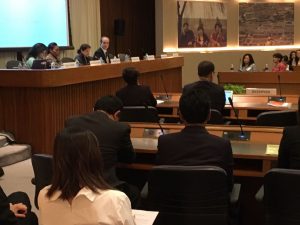Opening Remarks by H.E. Dessima Williams on behalf of H.E. Mr Peter Thomson, President of the 71st Session of the General Assembly at UN ESCAP SDG Week
28 November 2016
 Dr. Shamshad Akhtar, Executive Secretary of UN ESCAP, Excellencies and distinguished participants
Dr. Shamshad Akhtar, Executive Secretary of UN ESCAP, Excellencies and distinguished participants
I am very pleased to deliver this statement on behalf of the President of the UN General Assembly, H.E. Mr Peter Thomson.
Ladies and gentlemen, allow me to begin by thanking USG Akthar for providing me with this opportunity and by expressing my appreciation for the efforts being made by UN ESCAP to bring SDG implementation into focus in the Asia Pacific region.
On taking office just over two months ago, I made a solemn commitment to the members of the General Assembly to do all in my power to strengthen momentum around implementation of each of the 17 Sustainable Development Goals during my Presidency.
I did so because I see in the 2030 Agenda a master plan for humanity; a master plan for a better world. I see a once in a generation opportunity to end the scourge of poverty and advance peace and shared prosperity. And I see perhaps our final chance to bend the curve on climate change by embracing the green economy and the Paris Climate Agreement; thereby saving our people and our planet from a future of scarcity and conflict.
To seize this opportunity, however, we must act now, and we must act with the urgency and the commitment which the scale of our challenge demands.
First, we must raise public awareness about the SDGs.
People across the globe are searching for solutions to the major challenges they see in the world – the imminent threat of climate change and the destruction of our ocean; endemic poverty in some parts and rising levels of inequality in others; persistent levels of discrimination against women and girls and worrying trends relating to xenophobia, intolerance, terrorism, violent extremism and conflict.
People everywhere are looking for a way forward – a plan that demonstrates that simultaneously, we can create decent economic opportunities for all and live healthy and peaceful lives while ensuring the vitality of our planet.
In the SDGs, we have a framework that does just that. A framework agreed to and created by all 193 members of the UN. A framework of hope and possibility.
Now, we must bring the SDGs into the consciousness of the general public – into our schools, our workplaces, our families and our communities. We must work to ensure that people everywhere see these Goals as both their rights and their responsibilities.
I have written to Heads of Governments across the world to seek inclusion of the SDGs in school curricula everywhere and I encourage you all to seek inclusion of think of ways you can engage in similar awareness raising exercises.
Second, we must look to integrate the SDGs into the plans, policies and actions of central governments as well as regional and local authorities alike. In my tenure so far, I have seen some excellent examples of where this is already happening including in India and China but more can and must be done.
To have real impact, the SDGs must be about more than branding. They must go to the core of national planning, laws, regulations, budgets and decision making.
Here, regional commissions can play an important role in helping governments to understand how their peers are approaching integration.
I also encourage those countries that are succeeding in lifting millions out of poverty while also tackling environmental challenges to step forward and become role models for integrated and comprehensive SDG implementation at both the regional and global levels. And I will be engaging other regional commissions along the same lines over the coming months to emphasise this point.
Finally, I want to highlight the essential role of partnerships.
This of course is not new. Throughout the MDG-era, we saw how collaboration between governments, the private sector, non-government organizations, academia, and international partners can deliver genuine change that governments alone simply cannot achieve.
What is new, however, is the scale and scope of the partnerships we need to make this transformation happen across the 17 Goals.
In addition, our expectations of our partners are higher. We must work with them so that they can be both drivers of and examples of the transformation we need.
Here, the United Nations System has a critical role to play both on the ground and through follow-up, especially at the global level. The UN system has a responsibility to come together around the SDGs, to find new ways to make that crucial difference.
Over the coming months, the UN development system will have an opportunity to do just that in preparation for what I believe will be a truly game-changing UN conference on Oceans, 5 to 9 June next year – a conference that resonates particularly strongly with many in this region.
To conclude, ladies and gentlemen, achieving the Sustainable Development Goals and targets is a real possibility.
Our job is to make it an inevitability by strengthening momentum over these crucial first years.
We must raise awareness. We must embrace the integrated nature of the SDGs and we must work with all partners to make genuine change happen.
If we do so, by 2030, we will see an Asia Pacific region and a world at large without the scourge of poverty, without hunger; a world experiencing peace, prosperity and sustainability, where no one is left behind.
We have no time to lose, thus I urge you all to join the push to transform our world for the better, by achieving momentum this year on all seventeen Sustainable Development Goals.
Thank you.

